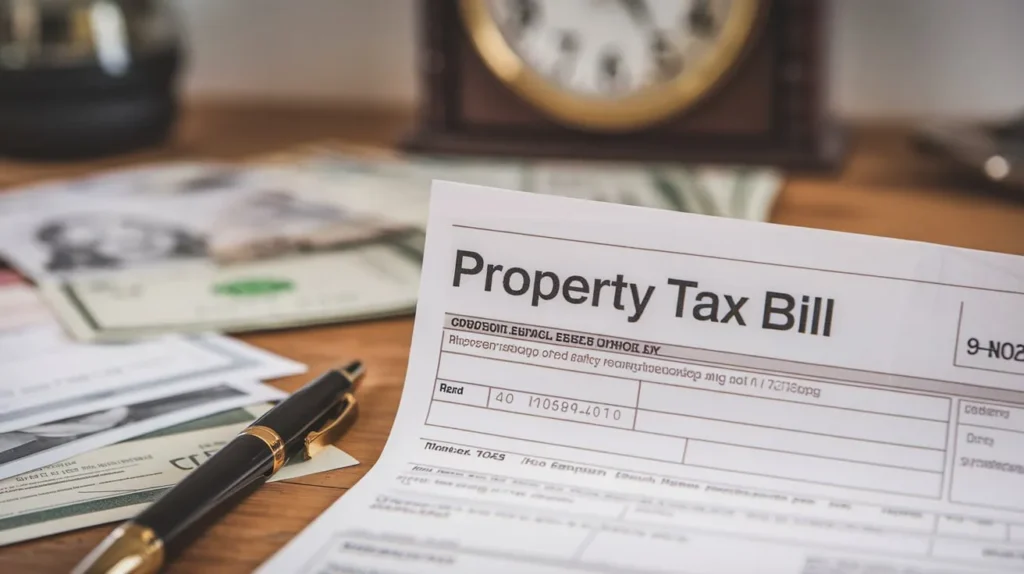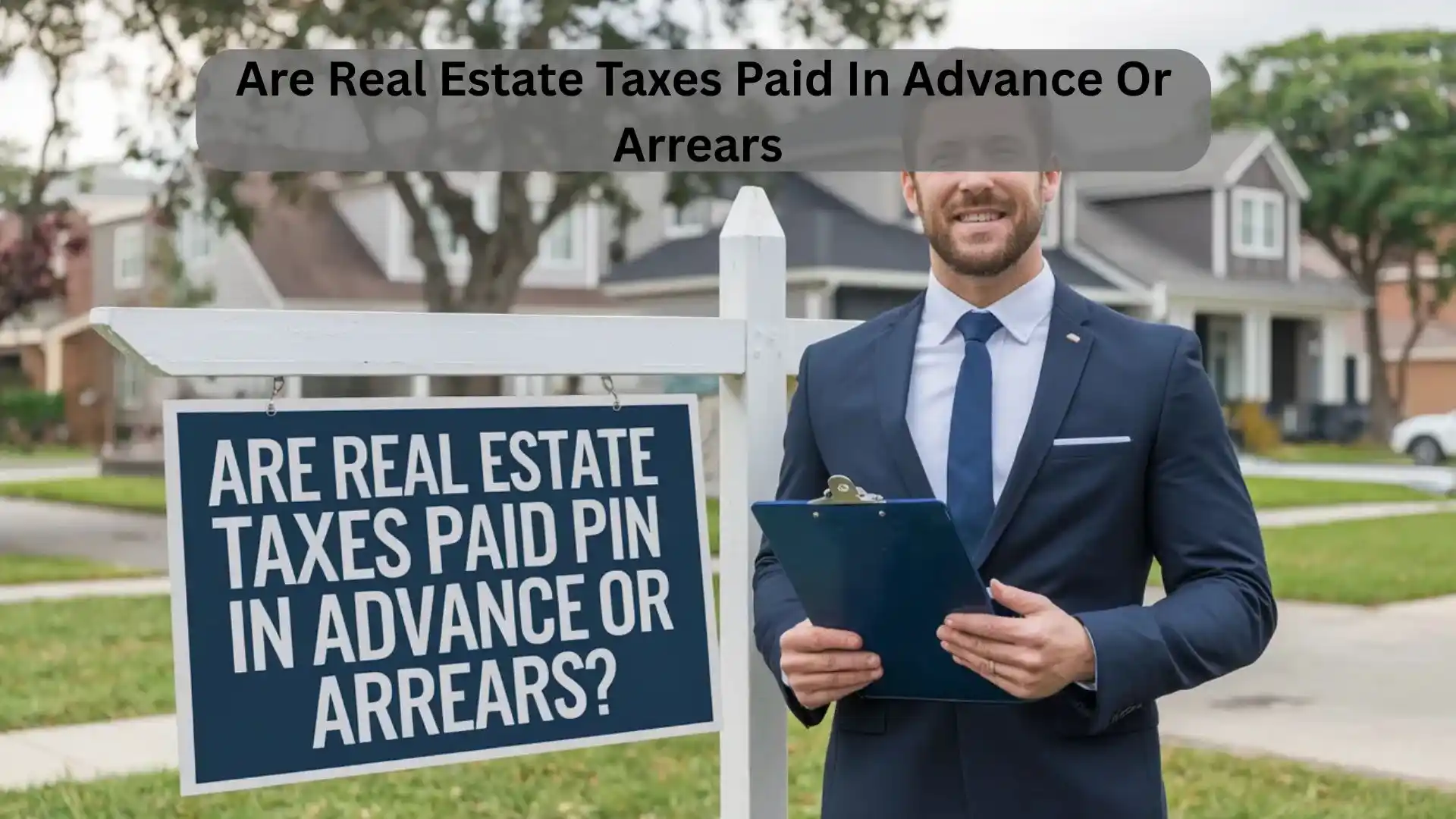Are Real Estate Taxes Paid In Advance Or Arrears – Full Guide!
Real estate taxes are usually paid in arrears, meaning after the tax year ends. Most states in the U.S. send the tax bill near the end of the year and collect payment the following year. Always check with your local tax office for exact dates.
Stay with us. We will talk about a simple question. Are real estate taxes paid in advance or arrears. Keep reading to know the correct answer.
What Are Real Estate Taxes?
Real estate taxes are payments made to the government by people who own land or property. These taxes are typically paid annually. The amount of tax depends on the value of the property. The government uses this money to pay for public services, such as schools, roads, police, and fire departments. If a person does not pay real estate taxes, then the government can take the property away.
What Does “Paid In Arrears” Mean In Real Estate?
Paid in arrears in real estate means that a payment is made after a service has already been used or finished. In most cases, property taxes and mortgage interest are paid in arrears. This means the owner is paying for the time that has already passed. For example, if someone pays property tax in December, then it is usually for the months that have already passed.
Who Is Responsible For Paying Them?
The property owner is responsible for paying real estate taxes. If the property is sold, then the seller pays the taxes for the time they owned the property. The buyer pays the taxes after they become the new owner. Sometimes the mortgage company collects the tax money each month and pays it to the government.
Why Is There Confusion Around Property Tax Payments?

There is confusion around property tax payments because different places have different rules. In some areas, taxes are paid in advance and others, they are paid later. Some people are not sure if their taxes are included in their mortgage payment or if they have to pay them separately. The tax amount and due date can also change each year making it harder for owners to keep track.
Why Does It Matter To Homeowners And Buyers?
Property taxes matter to homeowners and buyers because they affect the cost of owning a home. Homeowners are required to pay these taxes annually, which contributes to their monthly expenses.
Buyers need to be aware of property taxes before purchasing a home, as high taxes can increase the overall cost of ownership. If taxes are not paid, the property can be taken by the government.
What Does Real Estate Taxes Paid In Advance Mean?
Real estate taxes paid in advance mean that the property owner pays taxes for the year before it starts. For example, if taxes are due for the upcoming year, the owner would pay them before the year begins. This is different from paying in arrears when taxes are paid after the year is over.
What Is The General Rule Across The U.S.?
Here is a simplified explanation of the general rule for property tax payments across the United States:
1. Understanding Property Tax Payment Timing:
Property tax payment schedules can change significantly across different states and counties in the United States. However, a general pattern is observed in many areas.
2. Property Taxes Are Typically Paid in Arrears:
In most cases, property taxes are paid in arrears. This means that property owners pay taxes for the previous year during the current year. For example, taxes assessed in 2024 are usually paid in 2025.
3. Payment Schedules Vary by Location:
While the general rule is that taxes are paid in arrears, the specific due dates can differ. Some areas require payments to be made annually, semi-annually, or in quarterly instalments. It is important for property owners to check with their local tax authority to understand the exact payment schedule.
4. Consequences of Non-Payment:
Failing to pay property taxes on time can result in penalties, interest charges, and, in severe cases, the loss of the property through tax foreclosure. Therefore, property owners must stay informed about their local tax payment schedules and ensure timely payments.
Why This Matters In Real Estate Transactions?
Property taxes matter in real estate because they add to the cost of buying or selling a home. Buyers need to know whether taxes are paid in advance or after the sale. Sellers must pay any unpaid taxes before selling. Knowing about taxes helps avoid surprises during the sale.
What Is Tax Proration?

Tax proration is the process of dividing property taxes fairly between the buyer and seller based on the closing date. The seller pays taxes for the period they owned the property, and the buyer is responsible for taxes from the closing date onward. This ensures each party pays only for the time they owned the property.
How Is Tax Proration Calculated And Why Is It Important At Closing?
Calculating property tax proration ensures that buyers and sellers share the tax responsibility fairly based on their respective ownership periods. Here is a simple step-by-step guide:
1. Determine the Annual Property Tax Amount:
Find the total property tax for the year. This information is typically available from local tax authorities or recent tax bills.
2. Calculate the Daily Tax Rate:
Divide the annual tax amount by 365 (or 366 for a leap year) to get the daily tax rate. For example, if the annual tax is $3,650, the daily rate is $3,650 ÷ 365 = $10 per day.
3. Identify the Period of Ownership:
Determine the number of days each party owns the property during the tax year. The seller is responsible for the period from January 1st until the closing date, and the buyer is responsible from the closing date to December 31st.
4. Compute Individual Tax Responsibilities:
Multiply the daily tax rate by the number of days each party owns the property. For example, if the seller owns the property for 150 days, their tax responsibility is 150 days × $10 per day = $1,500. The responsibility of the buyer would be for the remaining days of the year.
5. Apply Proration at Closing:
At closing, adjust the sale price to reflect the prorated tax amounts. If the seller has prepaid taxes, the buyer may reimburse them for the portion of the year they will own the property. If taxes are unpaid, the seller may owe a credit to the buyer
6. Why Is Tax Proration Important At Closing?
Tax proration ensures fairness by dividing property tax responsibilities between the buyer and seller based on their ownership periods. This adjustment prevents either party from overpaying or underpaying taxes for the period during which they owned the property. Proper proration is essential for accurate financial planning and the smooth completion of transactions.
How Do Texas Property Tax Loans Work?
If you are struggling to pay your property taxes in Texas, a property tax loan can help. Here is how it works:
- Immediate Payment: The lender pays your overdue property taxes directly to the county, stopping penalties and foreclosure threats.
- Tax Lien Transfer: The county transfers the tax lien from your property to the lender, who now holds the lien as security.
- Flexible Repayment: You repay the lender in affordable monthly instalments over a period that suits your budget.
- Quick Process: Many lenders offer fast approval and closing, sometimes within 24 hours, with no upfront costs.
When Do Property Taxes Come Due?

Property tax due dates vary by state and local area in the U.S. In many places, property taxes are due annually, typically by January 1. Some areas allow payments in two or more instalments, so it is important to check with local authorities for exact dates.
Are Property Taxes Charged In Arrears In Texas?
Yes, property taxes in Texas are charged in arrears. This means that the taxes are assessed for the previous year and are due by January 31 of the following year. Property owners typically receive their tax bills in October or November, but the taxes are for the year that has already passed.
What Are The Benefits Of Property Tax Loans?
Property tax loans offer several advantages for homeowners facing challenges in paying their property taxes. Here are some key benefits:
- Avoid Foreclosure: By paying off delinquent taxes, homeowners can prevent the risk of losing their property due to tax foreclosure.
- Stop Accruing Penalties and Interest: These loans help halt the accumulation of additional fees and interest on unpaid taxes, which can quickly escalate.
- Flexible Repayment Terms: Lenders often offer more manageable payment plans compared to county tax offices, making it easier for homeowners to repay the loan.
- Quick Processing: The application process is typically fast and straightforward, often requiring no credit checks or down payments.
- Preserve Property Ownership: By addressing tax delinquencies promptly, homeowners can maintain their ownership and continue to benefit from the value of their property.
Why Choose Afic For Your Texas Property Tax Loan?
AFIC makes getting a property tax loan easy with no credit check and no upfront payments. They offer flexible payment plans that fit your budget. With over 75 years of experience, AFIC helps homeowners avoid foreclosure and penalties, making them a trusted choice in Texas.
What Are Some Tips For Homeowners?

Property taxes can be a significant expense for homeowners, but there are ways to manage them. Here are some helpful tips to keep in mind:
1. Stay Informed About Tax Deadlines:
Mark the necessary property tax due dates on your calendar to avoid missing payments. This helps you plan and avoid late fees.
2. Review Your Tax Bill for Accuracy:
Review your property tax bill to verify that the assessment is accurate. If you believe your tax bill is too high, you can appeal it.
3. Consider Setting Up a Payment Plan:
Some counties allow homeowners to pay taxes in instalments. Setting up a plan can make it easier to manage your payments over time.
4. Apply for Property Tax Exemptions:
In some areas, homeowners may qualify for exemptions that lower their property taxes. Check with your local tax authority to see if you are eligible.
5. Pay Early to Avoid Penalties:
Paying property taxes early can help avoid interest and penalties. It also gives you peace of mind knowing your taxes are covered.
How Can Homeowners Plan For Tax Payments?
Homeowners can plan for tax payments by setting aside money each month and marking tax due dates on their calendars. They can set up payment plans if available, making payment easier.
Checking the tax bill for errors and applying for exemptions can also help lower taxes. Planning helps avoid late fees and stress.
FAQ’s:
1. Are property taxes paid in advance or arrears?
Property taxes are typically paid in arrears, which means they are paid after the tax year has ended. The payment is for the previous year, not the current year.
2. What does paying real estate taxes in arrears mean?
Paying real estate taxes in arrears means that taxes are paid for a prior year, not for the current year. The payment is due after the tax year has concluded.
3. Are Texas property taxes paid ahead or behind?
In Texas, property taxes are paid in arrears. This means that property taxes are assessed for the previous year and are due by January 31 of the following year.
4. Are MN property taxes paid in arrears?
Yes, property taxes in Minnesota are paid in arrears. The taxes are for the prior year and are paid after the year ends, typically in two instalments.
5. How are property taxes paid in Minnesota?
In Minnesota, property taxes are paid in two instalments. The first instalment is due by May 15, and the second instalment is due by October 15.
6. Are my property taxes paid through my mortgage?
If you have an escrow account set up with your mortgage lender, your property taxes may be paid through that account. The lender collects the tax payments along with your mortgage payment and then pays the taxes on your behalf.
YouTube Video Guide:
Conclusion:
Understanding property taxes helps homeowners avoid stress and extra costs. Knowing if taxes are paid in advance or arrears, staying aware of due dates and using options like automatic payments or tax loans can make payments simpler. Always check your local rules and plan. This way, you stay on track and protect your home from penalties or foreclosure.
You Also Have To Check:




Post Comment